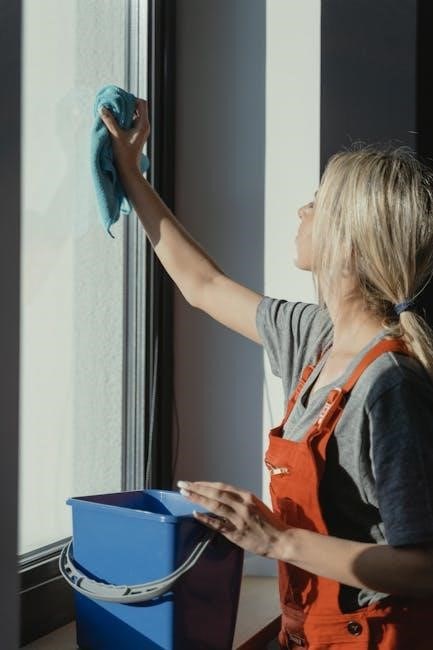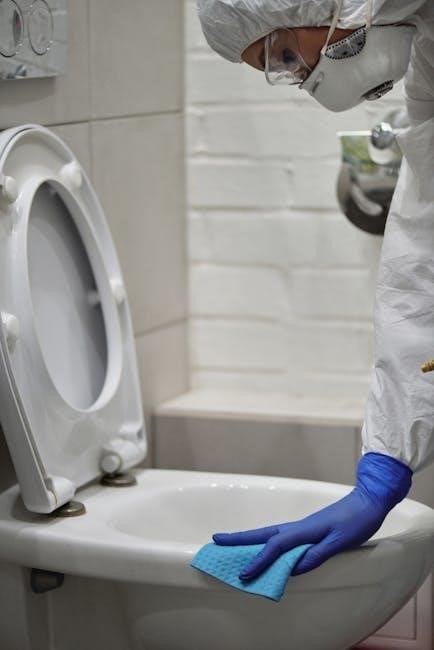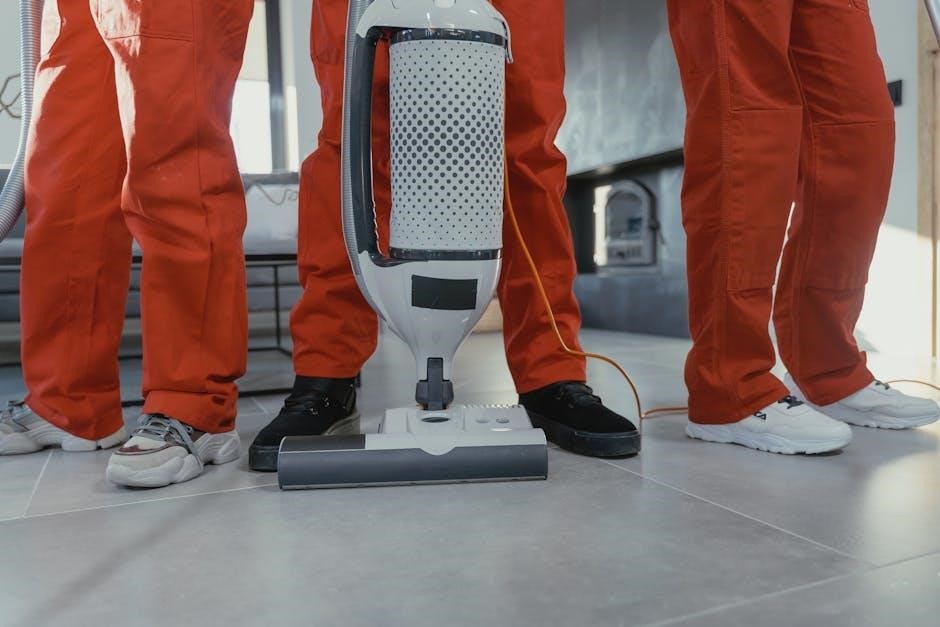This guide provides essential information on the Cleaning Services Award, outlining minimum pay rates, entitlements, and compliance requirements for employers in the cleaning services industry. The updated rates, effective from 1 July 2024, include a 3.75% increase, ensuring fair wages for employees. It serves as a comprehensive resource for understanding the award’s provisions and staying compliant with workplace regulations.
Overview of the Cleaning Services Award 2020 (MA000022)
The Cleaning Services Award 2020 (MA000022) is a modern award that commenced operation on 1 January 2010. It sets out the minimum wages and conditions for employees in the cleaning services industry across Australia. The award applies to employers and employees in the cleaning services sector, including commercial, industrial, and residential cleaning. It defines the standard rate of pay, classifications, and entitlements such as penalty rates, overtime, and allowances. The award is regularly updated to reflect changes in wages and workplace conditions, with the most recent updates including a 3.75% increase in pay rates from 1 July 2024. The award also includes provisions for shift work, night shifts, and weekend penalties, ensuring fair compensation for employees. Employers must adhere to the terms of the award to maintain compliance with workplace laws. Detailed pay rates and conditions can be found in Schedule B and the Pay and Conditions Tool.

Key Components of the Cleaning Services Award Pay Guide
The pay guide outlines hourly and weekly rates, classification levels, penalty rates, and allowances. It ensures compliance with the Cleaning Services Award, providing transparency for employers and employees alike.
Hourly and Weekly Pay Rates for Cleaning Services Employees

The Cleaning Services Award provides detailed hourly and weekly pay rates for employees, ensuring fair compensation. As of 1 July 2024, casual Level 1 employees receive 31.21 per hour on weekdays, 43.70 on Saturdays, and 56.18 on Sundays. Full-time and part-time employees have fixed weekly rates based on their classification. These rates are updated annually to reflect cost-of-living adjustments, with the 2024 increase being 3.75%. Employers must adhere to these rates to avoid underpayment issues. The Fair Work Commission’s pay rate viewer offers a tool to calculate accurate wages, including overtime and penalty rates, ensuring transparency and compliance for both employers and employees in the cleaning industry.

Classification Levels and Their Corresponding Pay Rates
The Cleaning Services Award categorizes employees into distinct classification levels, each with specific pay rates reflecting their roles and responsibilities. Level 1 includes basic cleaning tasks, with casual employees earning 31.21 per hour on weekdays, while Level 2 involves more complex duties, such as specialized cleaning, with higher rates. Level 3 typically includes supervisory or technical roles, commanding premium pay. These rates are effective from 1 July 2024 and are adjusted annually to ensure fair compensation. Employers must ensure they classify employees correctly to avoid underpayment. The Fair Work Commission provides tools, like the pay rate viewer, to help calculate accurate wages based on these classifications, ensuring compliance with the award’s standards. Proper classification is crucial for both employees and employers to maintain fairness and transparency in the workplace.

Recent Updates: 3.75% Increase in Pay Rates from 1 July 2024
As of 1 July 2024, the Cleaning Services Award implemented a 3.75% increase in pay rates, affecting all employees covered by the award. This adjustment reflects the Fair Work Commission’s annual wage review, ensuring wages align with cost-of-living pressures. The updated rates apply to the first full pay period on or after this date. For example, casual Level 1 employees now earn $31.21 per hour on weekdays, $43.70 on Saturdays, and $56.18 on Sundays. Employers must ensure compliance with these new rates to avoid penalties. The updated pay rates are detailed in the pay rate viewer and relevant resources. This increase underscores the commitment to fair compensation in the cleaning services industry, ensuring employees receive wages that reflect current economic conditions.
Penalty Rates and Allowances
This section outlines penalty rates and allowances for cleaning services employees, including higher pay for weekends, public holidays, overtime, and night shifts. These provisions ensure fair compensation for less convenient working hours.
Weekend and Public Holiday Penalty Rates
Under the Cleaning Services Award, employees are entitled to penalty rates for working on weekends and public holidays. For casual Level 1 employees, weekend rates are 43.70 per hour on Saturdays and 56.18 per hour on Sundays. Public holidays attract similar or higher penalties, ensuring workers receive fair compensation for their time. These rates apply from the first full pay period on or after 1 July 2024, reflecting the 3.75% pay increase; Employers must adhere to these rates to remain compliant with the award’s provisions. The Fair Work Commission’s updates ensure that workers are adequately remunerated for their efforts during these periods.
Overtime Rates and Conditions
Overtime rates under the Cleaning Services Award are designed to compensate employees for work beyond standard hours. For most classifications, overtime is paid at 1.5 times the standard rate for the first two hours and 2 times the standard rate thereafter. These rates apply to both full-time and casual employees. Overtime is typically required for work exceeding 38 hours per week or outside ordinary hours. The award specifies that overtime must be agreed upon in writing or by an electronic agreement. Employers are obligated to pay these rates to ensure fair compensation for additional work. The Cleaning Services Award also outlines conditions for overtime, ensuring transparency and consistency in application. These provisions are essential for maintaining equitable workplace practices and preventing employee exploitation.
Night Shift Allowances and Loadings
Night shift allowances and loadings are additional payments made to employees who work during late hours. Under the Cleaning Services Award, employees are entitled to a night shift loading of 1.5 times the standard hourly rate for shifts worked between specific late-night hours. These loadings are designed to compensate workers for the inconvenience of working during unconventional times. The exact percentage and conditions for night shift allowances vary based on the employee’s classification and the timing of their shifts. For example, shifts ending after midnight may attract higher loadings. Employers must ensure these payments are included in employee wages to comply with the award. Night shift allowances are a crucial component of fair compensation for workers in the cleaning services industry, reflecting the challenges of late-hour work.

Compliance and Enforcement
Employers must adhere to the Cleaning Services Award’s terms, ensuring accurate pay rates and entitlements. Non-compliance risks penalties, with the Fair Work Commission enforcing adherence to award standards rigorously.
Employer Obligations Under the Cleaning Services Award
Employers in the cleaning services industry must comply with the Cleaning Services Award 2020 (MA000022), ensuring employees receive correct pay rates, entitlements, and conditions. Key obligations include paying minimum wages as outlined in the award, adhering to classification levels, and providing accurate pay slips. Employers must also maintain proper records of hours worked, pay rates, and leave entitlements. Compliance with penalty rates, overtime, and night shift allowances is mandatory. Employers are required to consult employees before making changes to rosters or conditions that affect their pay. Failure to meet these obligations can result in legal action, fines, and reputational damage. Employers must stay updated on award changes, such as the 3.75% pay rate increase from 1 July 2024, to ensure ongoing compliance and avoid penalties.
Consequences of Non-Compliance with the Award
Non-compliance with the Cleaning Services Award can result in severe legal and financial repercussions for employers. Failure to pay correct wages, penalty rates, or overtime can lead to fines and legal action under the Fair Work Act. Employees may lodge complaints with the Fair Work Ombudsman to recover unpaid wages. Employers found in breach of the award may face penalties, including substantial fines, damage to their business reputation, and loss of employee trust. Additionally, non-compliance can result in audits and inspections by regulatory bodies, further complicating operations. It is crucial for employers to adhere to the award’s provisions to avoid these consequences and maintain a fair workplace environment. Legal action can also require employers to back-pay underpaid workers, emphasizing the importance of compliance with the Cleaning Services Award 2020 (MA000022).

Leave a Reply
You must be logged in to post a comment.